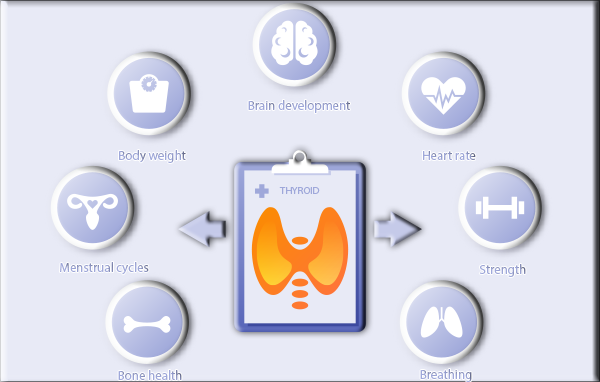The 6 Common Thyroid Problems & Diseases
The 6 Common Thyroid Problems & Diseases
Our body’s hormonal system needs to maintain a delicate equilibrium for optimal health, with the thyroid holding significant influence in this intricate balance. From disrupting the normal functioning of the butterfly-shaped gland situated in the neck, thyroid problems encompass a variety of conditions. It is crucial to comprehend the underlying causes and symptoms in order to detect and treat them promptly.
What Causes Thyroid Problems?
Delving into the underlying triggers of thyroid issues reveals a intricate interplay of factors that can impact the wellbeing of this critical organ. Oftentimes, Thyroid symptoms dysfunction stem from a blend of genetic and environmental factors. Graves’ Disease is a complex autoimmune disorder that wreaks havoc on the body. The immune system mistakenly attacks the thyroid gland, causing an excessive production of thyroid hormones. As a result, a chain reaction of impacts is set in motion. One of these is thyroiditis, an inflammation of the thyroid gland that leads to the release of stored thyroid hormones into the bloodstream. Another complication is Toxic Nodular Goiter, where nodules or lumps in the thyroid gland produce thyroid hormones independently, circumventing the body’s natural checks and balances.
Exceeding recommended levels of iodine in one’s diet or through medication can greatly contribute to the development of hyperthyroidism, making it imperative to monitor and control iodine intake for optimal thyroid health. Additionally, excessive usage of thyroid hormone medication can also lead to hyperthyroidism, emphasizing the importance of careful usage under proper medical supervision. Furthermore, the presence of a Pituitary Adenoma, a growth in the pituitary gland, can overstimulate the production of hormones by the thyroid, further complicating thyroid functioning. Ultimately, a thorough understanding of the various causes of hyperthyroidism is crucial in effectively managing this condition, as these causes range from internal autoimmune disorders to external influences.
Hyperthyroidism
Hyperthyroidism, an ailment caused by an overactive thyroid gland, is a widespread thyroid disorder that holds significant consequences for those diagnosed. It is commonly associated with the autoimmune illness Graves disease. Exploring the complexities of hyperthyroidism reveals its effects on metabolism and overall health.
Hyperthyroidism Symptoms
Knowing the signs and symptoms of hyperthyroidism is crucial for catching and addressing it early. Whether it’s rapid heart rate or unexpected weight loss, those dealing with hyperthyroidism may face a variety of unsettling effects. Although their appetite may have increased, individuals could still suffer from unexplained weight loss. This perplexing occurrence is typically accompanied by various other symptoms. Palpitations and a racing heart rate are often present, signaling an elevated heart rate. Additionally, excessive levels of thyroid hormones, which trigger these cardiovascular changes, can also have an impact on the nervous system. As a result, individuals may experience heightened levels of anxiety and irritability, contributing to an overall sense of restlessness. Furthermore, individuals may also have difficulty tolerating warm temperatures and may experience an increase in sweating, a condition known as heat intolerance. Paradoxically, despite an increase in metabolic activity, individuals may feel exhausted or weak, leading to feelings of fatigue. The exhaustion is often accompanied by a sense of physical weakness, as the muscles may tremble noticeably. Furthermore, thyroid disorders have the ability to impact reproductive health, leading to shifts in menstrual patterns, such as irregular cycles in women. The intricate relationship between these symptoms serves as a reminder of the complexity of thyroid-related concerns and the multitude of ways in which they can affect the body.
Hyperthyroidism Diagnosis and Treatment
In order to reduce the excessive production of thyroid hormones, physicians often prescribe anti-thyroid medications such as methimazole or propylthiouracil. Alternatively, radioactive iodine therapy is used, which involves taking in radioactive iodine to target and eliminate the overactive thyroid cells. To address troublesome symptoms like rapid heart rate and trembling commonly associated with thyroid disorders, beta-blockers play a crucial role in managing them effectively. In more severe cases, the thyroid gland may need to be partially or fully removed through a surgical procedure known as thyroidectomy. Regular monitoring of thyroid function is essential to ensure the success of treatment, as it allows for necessary adjustments to the therapeutic approach as needed.

Hypothyroidism
Exploring the complex network of elements that play a role in the development of hypothyroidism yields valuable insights into effectively understanding and treating this prevalent condition. The thyroid symptoms can present in a multitude of forms, affecting one’s energy levels, metabolism, and overall quality of life. By delving into the underlying causes, individuals can gain a better understanding of potential triggers and take proactive steps to minimize potential risks.
Hypothyroidism Symptoms
Hypothyroidism can present with a range of severity in symptoms, developing gradually over time. One prevalent manifestation is overwhelming fatigue, alongside a persistent lack of energy. Despite maintaining a consistent diet, individuals may also struggle with unexplained weight gain. Another common symptom is cold intolerance, causing heightened sensitivity to cold temperatures and an enduring feeling of chilliness. Hypothyroidism often manifests in the form of parched skin and fragile hair, with the skin becoming excessively dry and the hair losing its usual texture. This condition also tends to cause widespread muscle discomfort and weakness, resulting in overall pain and reduced muscle strength. Additionally, joint pain is a prevalent symptom, leading to stiffness and aches in various joints throughout the body.
Constipation, often observed in individuals with hypothyroidism, is caused by sluggish digestion and challenges with passing stool. Furthermore, depression is a prevalent factor that can bring about feelings of sorrow or a constant state of melancholy. Women may also encounter menstrual irregularities, serving as a sign of alterations in their monthly cycle. People with hypothyroidism may experience memory issues, such as trouble concentrating and recalling memories. The wide range of symptoms highlights the intricate nature of hypothyroidism and how it can affect multiple bodily functions.
Hypothyroidism Diagnosis and Treatment
Navigating hypothyroidism requires precise identification and customized treatment strategies. The diagnostic procedures, which encompass thorough blood tests to evaluate thyroid hormone levels, are crucial in confirming the condition. Hormone replacement therapy serves as the primary treatment for hypothyroidism, involving the administration of synthetic thyroid hormones like levothyroxine to make up for the deficient thyroid hormones. Close and consistent monitoring is vital in effectively managing this condition. Periodic adjustments to the medication may be needed, and frequent blood tests support the maintenance of normal thyroid hormone levels. Accompanied by medication, lifestyle modifications play a pivotal role in maintaining optimal health. Adopting a balanced diet, staying physically active, and efficiently managing stress all contribute to a holistic approach to well-being. Furthermore, investigating and addressing underlying factors is essential in the treatment plan. In cases where hypothyroidism is linked to other health issues like autoimmune disorders or lack of iodine, addressing the underlying problem becomes a crucial component of the treatment plan. Seeking advice from a healthcare expert is imperative for those struggling with symptoms of hypothyroidism, as it allows for accurate diagnosis and the implementation of proper remedies.
Hashimoto’s Thyroiditis
As we delve into the complexities of Hashimoto’s thyroiditis, a fascinating viewpoint on autoimmune thyroid disorders emerges. The symptoms of this condition can be quite subtle yet greatly impactful, manifesting differently in each individual. To effectively navigate and tackle the far-reaching consequences of Hashimoto’s thyroiditis, it is crucial to grasp the underlying mechanisms at play.
Hashimoto’s Thyroiditis Symptoms
Hashimoto’s thyroiditis can cause individuals to endure continuous feelings of exhaustion and lack of strength, making everyday tasks a struggle. This persistent fatigue is closely connected to unexplained weight gain, which is often a result of a sluggish metabolism. Along with these physical effects, individuals may also experience discomfort from muscle and joint pain and stiffness. The condition can also lead to changes in mood, such as depression, affecting the overall mental and emotional well-being. Another common symptom is an increased sensitivity to cold temperatures, adding to the many difficulties faced by those dealing with Hashimoto’s thyroiditis. As the body experiences thyroid hormone imbalances, it can also suffer from dry skin and brittle hair, further exacerbating the toll this condition takes on physical health. In addition, sluggish digestion can contribute to constipation, revealing yet another aspect of the intricate nature of this thyroid disorder. For women, disrupted menstrual cycles may also arise, showcasing the widespread impact of Hashimoto’s thyroiditis on overall wellness. The combination of these symptoms serves to underscore the intricate and profound effects of this condition on both the body and mind.
Hashimoto’s Thyroiditis Diagnosis and Treatment
Blood tests are essential for evaluating thyroid function. They measure important hormones (TSH, T3, and T4) and antibodies (anti-thyroid peroxidase antibodies). Along with blood tests, imaging techniques like ultrasound can also provide valuable insights into the thyroid gland and reveal any potential problems. For instance, if nodules are discovered, a Fine-Needle Aspiration (FNA) biopsy may be performed to eliminate the possibility of thyroid cancer. After being diagnosed with a thyroid disorder, it is common for doctors to recommend Hormone Replacement Therapy. This often includes the prescription of levothyroxine, a synthetic thyroid hormone, to help supplement any hormonal imbalances. It is important to closely monitor thyroid function through routine blood tests in order to effectively manage this condition. This allows for necessary adjustments in medication dosage to be made, ensuring the best possible results. In addition to medical treatments, making changes to one’s lifestyle also plays a crucial role in promoting overall well-being. Prioritizing a nutritious diet, incorporating physical activity into daily routines, and effectively managing stress all work together to create a comprehensive approach to managing thyroid conditions. In instances where inflammation is a concern, healthcare professionals may suggest utilizing anti-inflammatory drugs, such as NSAIDs, to alleviate symptoms and further bolster the treatment plan as a whole.

